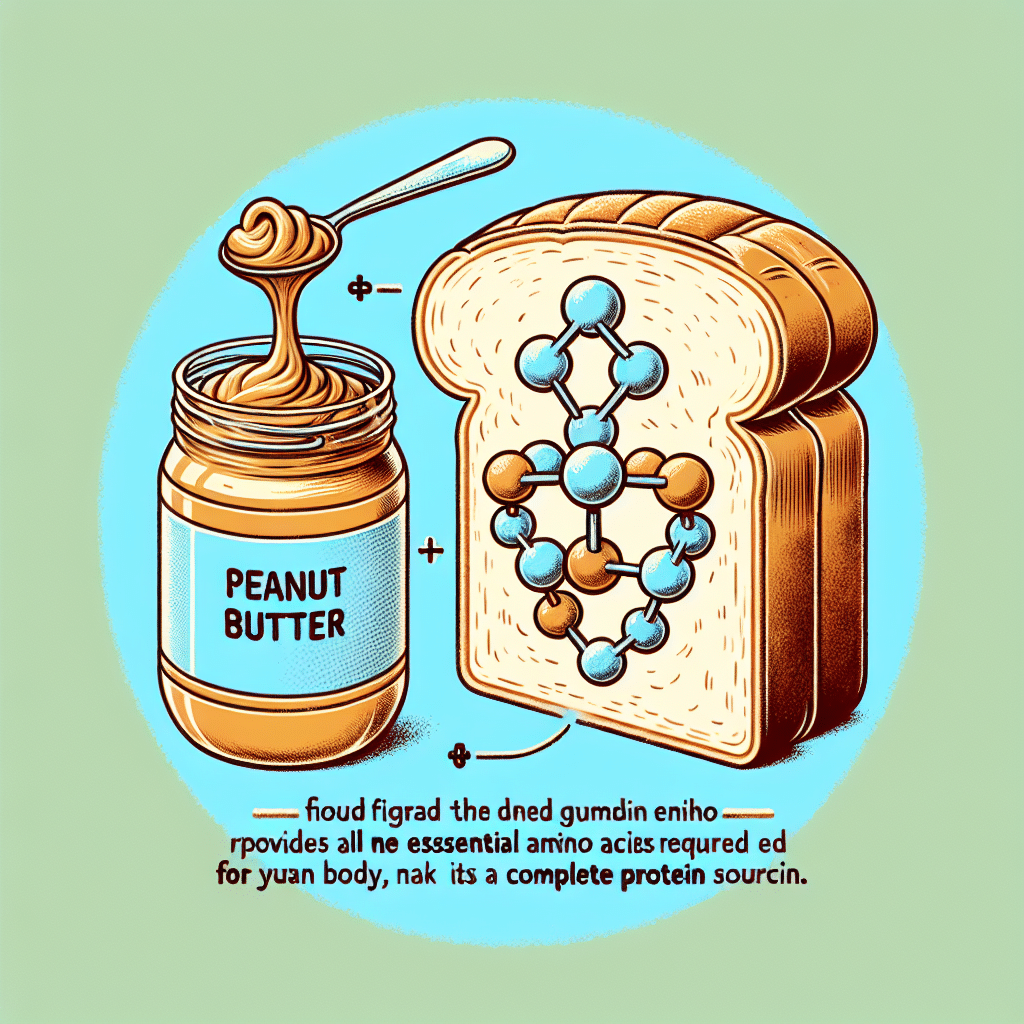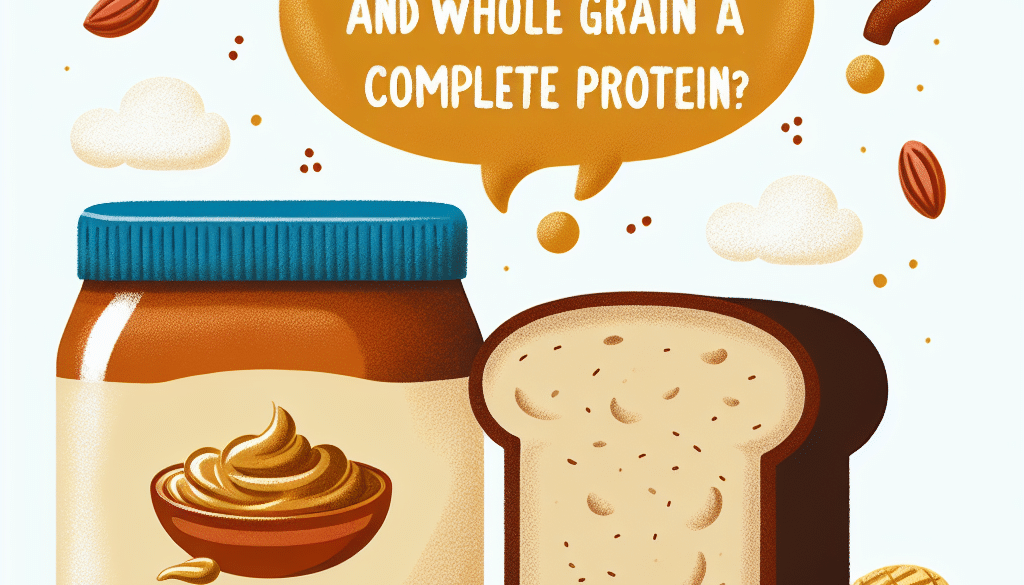Is Peanut Butter And Whole Grain A Complete Protein?
-
Table of Contents
- Complete Protein Combinations: Peanut Butter and Whole Grain
- Understanding Complete Proteins
- The Peanut Butter and Whole Grain Combination
- Peanut Butter’s Protein Profile
- Whole Grain’s Contribution
- Do They Make a Complete Protein?
- Scientific Evidence and Dietary Recommendations
- Benefits of Peanut Butter and Whole Grain
- Considerations for a Balanced Diet
- Conclusion: A Versatile and Nutritious Pairing
- Discover ETprotein’s High-Quality Protein Products
Complete Protein Combinations: Peanut Butter and Whole Grain

When it comes to maintaining a healthy diet, understanding the role of protein is crucial. Proteins are the building blocks of life, essential for the growth and repair of tissues, and for the proper functioning of our bodies. Amino acids are the components of proteins, and while our bodies can produce some of these, there are nine essential amino acids that must be obtained through our diet. A complete protein source is one that provides all nine of these essential amino acids in sufficient quantities.
Understanding Complete Proteins
Complete proteins are typically found in animal products such as meat, fish, poultry, eggs, and dairy. However, for vegetarians, vegans, or those looking to reduce their meat consumption, finding plant-based complete proteins can be a challenge. This is where the concept of protein combining comes in, which involves eating different plant-based foods that, when combined, provide all the essential amino acids.
The Peanut Butter and Whole Grain Combination
Peanut butter and whole grain bread are two popular foods that, when eaten together, are often cited as a complete protein combination. But is this pairing truly sufficient to meet our dietary protein needs?
Peanut Butter’s Protein Profile
Peanut butter is a good source of protein, with about 8 grams of protein per two-tablespoon serving. However, it lacks certain essential amino acids, such as methionine and cysteine, which are necessary for a protein to be considered complete.
Whole Grain’s Contribution
Whole grains, on the other hand, are generally rich in the amino acids that peanut butter lacks. For example, whole wheat bread contains methionine and cysteine. However, grains tend to be low in lysine, an amino acid where peanut butter excels.
Do They Make a Complete Protein?
When you combine peanut butter with whole grain bread, you are bringing together complementary amino acid profiles. This means that the amino acids that are deficient in peanut butter are present in whole grains, and vice versa. As a result, the combination can provide a more balanced amino acid profile that is closer to that of a complete protein.
Scientific Evidence and Dietary Recommendations
Research has shown that the body can combine amino acids from different meals throughout the day to form complete proteins. This means that it’s not necessary to consume all essential amino acids in one sitting. As long as your overall daily diet is varied and includes different sources of plant proteins, your body can pool the necessary amino acids to meet your needs.
Benefits of Peanut Butter and Whole Grain
Beyond their potential to form a complete protein when eaten together, peanut butter and whole grains offer additional health benefits:
- Heart Health: Both foods contain heart-healthy fats and fiber, which can help lower cholesterol levels and reduce the risk of heart disease.
- Energy: The combination provides a good balance of protein, fats, and carbohydrates, offering sustained energy throughout the day.
- Weight Management: The fiber and protein content can help you feel full longer, potentially aiding in weight management efforts.
Considerations for a Balanced Diet
While peanut butter and whole grain can contribute to a complete protein profile, it’s important to include a variety of other protein sources in your diet. Other plant-based combinations that can provide a complete protein include rice and beans, hummus and pita bread, and quinoa, which is a complete protein on its own.
Conclusion: A Versatile and Nutritious Pairing
In conclusion, peanut butter and whole grain can be part of a complete protein diet when combined with a variety of other protein sources throughout the day. This pairing is not only nutritious but also versatile and can be included in many different meals and snacks. By understanding the principles of protein combining, you can ensure that your diet is balanced and provides all the essential amino acids your body needs.
Discover ETprotein’s High-Quality Protein Products
If you’re looking to supplement your diet with additional protein sources, consider exploring ETprotein’s range of organic bulk vegan proteins. Their products, including peanut protein, are characterized by a neutral taste, non-GMO, allergen-free attributes, and high purity levels, making them an excellent choice for those seeking to enhance their protein intake.
About ETprotein:
ETprotein, a reputable protein and L-(+)-Ergothioneine (EGT) Chinese factory manufacturer and supplier, is renowned for producing, stocking, exporting, and delivering the highest quality organic bulk vegan proteins and L-(+)-Ergothioneine. They include Organic rice protein, clear rice protein, pea protein, clear pea protein, watermelon seed protein, pumpkin seed protein, sunflower seed protein, mung bean protein, peanut protein, and L-(+)-Ergothioneine EGT Pharmaceutical grade, L-(+)-Ergothioneine EGT food grade, L-(+)-Ergothioneine EGT cosmetic grade, L-(+)-Ergothioneine EGT reference grade and L-(+)-Ergothioneine EGT standard. Their offerings, characterized by a neutral taste, non-GMO, allergen-free attributes, with L-(+)-Ergothioneine purity over 98%, 99%, cater to a diverse range of industries. They serve nutraceutical, pharmaceutical, cosmeceutical, veterinary, as well as food and beverage finished product distributors, traders, and manufacturers across Europe, USA, Canada, Australia, Thailand, Japan, Korea, Brazil, and Chile, among others.
ETprotein specialization includes exporting and delivering tailor-made protein powder and finished nutritional supplements. Their extensive product range covers sectors like Food and Beverage, Sports Nutrition, Weight Management, Dietary Supplements, Health and Wellness Products, and Infant Formula, ensuring comprehensive solutions to meet all your protein needs.
As a trusted company by leading global food and beverage brands and Fortune 500 companies, ETprotein reinforces China’s reputation in the global arena. For more information or to sample their products, please contact them and email sales(at)ETprotein.com today.












